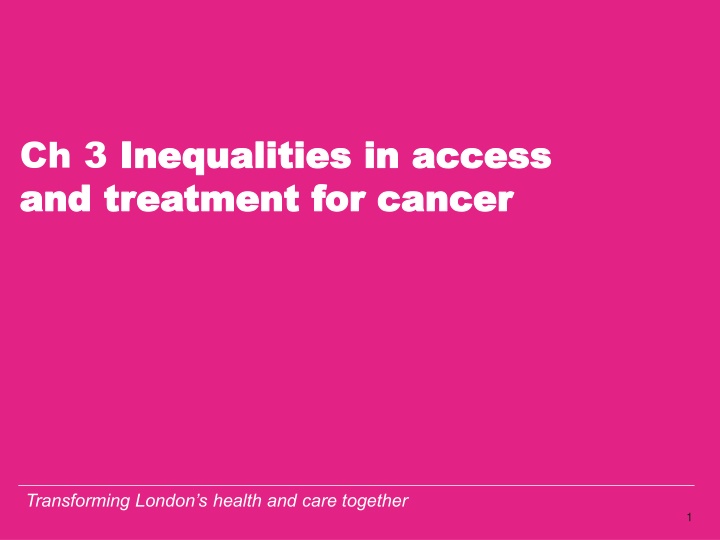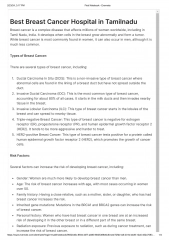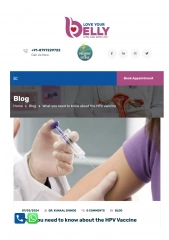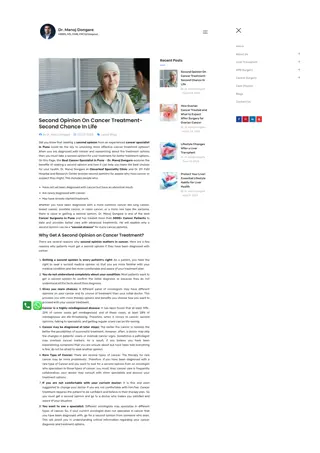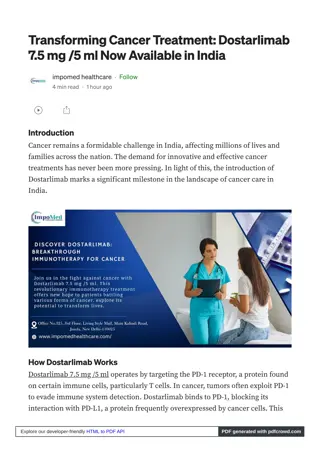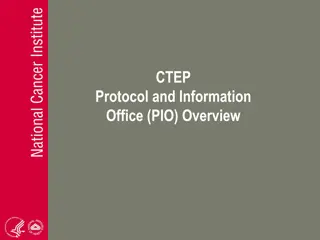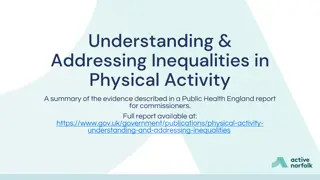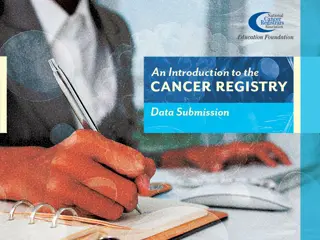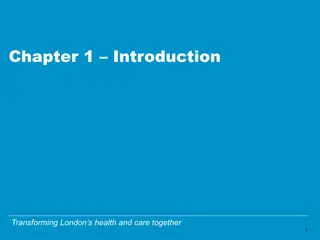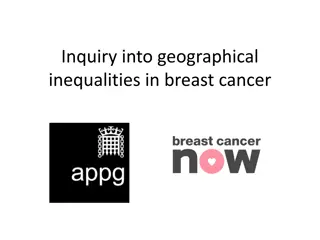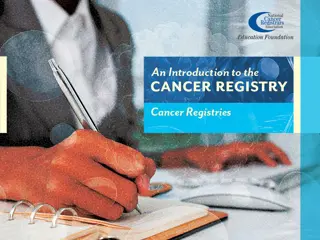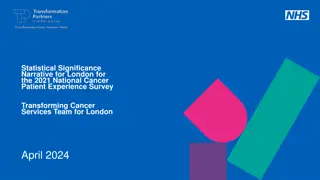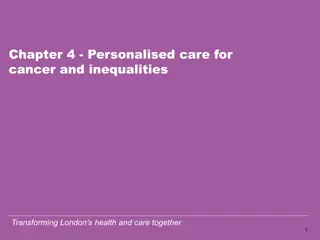Inequalities in Access and Treatment for Cancer in London
This content outlines the disparities in access to cancer treatment in London, focusing on emergency cancer diagnoses, variations in treatment outcomes, and access to trial treatments. It discusses factors contributing to emergency diagnoses and highlights issues such as delayed access to GPs and multi-morbidity masking cancer in the elderly population.
Download Presentation

Please find below an Image/Link to download the presentation.
The content on the website is provided AS IS for your information and personal use only. It may not be sold, licensed, or shared on other websites without obtaining consent from the author.If you encounter any issues during the download, it is possible that the publisher has removed the file from their server.
You are allowed to download the files provided on this website for personal or commercial use, subject to the condition that they are used lawfully. All files are the property of their respective owners.
The content on the website is provided AS IS for your information and personal use only. It may not be sold, licensed, or shared on other websites without obtaining consent from the author.
E N D
Presentation Transcript
Ch 3 Inequalities in access Inequalities in access and treatment for cancer and treatment for cancer Transforming London s health and care together 1
Access and treatment for cancer outline Cancer diagnosed as an emergency in London Variation Types of treatment (breast cancer) Variation in bowel cancer outcomes Variation in lung cancer outcomes 5 year survival Treatment modalities variation Variation in access to trial treatment and surgery 2
Cancer diagnosed as an emergency Transforming London s health and care together 3
Cancer diagnosed as an emergency UCL audit UCLPartners (UCLP) 2015 audit In London, 41% of lung cancers and 28% of colorectal cancers are diagnosed through an emergency route compared to 38% and 25% England average. UCLP 2015 Deep dive of 963 patients presenting as an emergency The primary care root cause analysis in 138 patients showed: 78% of patients had one or more co- morbidities 64% of patients went to A&E with symptoms lasting less than a month 63% of patients had seen their GP for the same problem prior to A&E and over half of these patients had been referred by their GP for tests but deteriorated whilst waiting. 27 patients had an in-depth interview as part of a research sub-study. The most common reason for delay was not thinking the problem was serious (53%) No-one stated that they were too embarrassed to go to their GP Only 6% were worried about wasting the GPs time 7% of people had delay because they were worried about what would be found. This group tended to wait the longest before seeking help Participants were put off seeking help for a second or third time if a medical practitioner had already given them a tentative diagnosis 4
Cancer diagnosed as an emergency This is a complex area (Zhou et al 2016) Being diagnosed as an emergency - patients have poorer clinical and patient reported outcomes than patients not diagnosed as an emergency Combination of tumour related, patient related, and healthcare related factors Tumour related more likely to be cancer with non specific symptoms Patient related -23% of patients had had red flag symptoms Youngest and oldest age groups more likely to be diagnosed as an emergency Colorectal cancer audit- 20% of patients had had typical alarm symptoms recorded in the year before diagnosis Higher levels of comorbidity with other hospitalizations in the year prior to diagnosis Ethnic minorities, more likely to be non white or Asian Healthcare related practices with better access, lower levels emergency presentation Reflections on Zhou et al (2016): Is cancer being masked by multi- morbidity in the elderly? Is there an issue with patients not having timely access to a GP? Evidence from an English national data source indicates that approximately 30% of emergency presentations are generated by direct emergency referral to hospital services by primary-care physicians 5
Cancer diagnosed as an emergency (London) 1 year rolling average from Q1 2018: Best Croydon, worst Waltham Forest 1 yr rolling average emergency presentations 2017 per cent % 25 20 15 10 5 0 6
Access and emergency presentations What needs to change in London? Recommendations Summary: If emergency presentations are more common in ethnic minority patients address difficulties in getting a GP appointment in areas with high deprivation/BME groups Cancer presenting as an emergency is a complex area It varies from highest (worst ) in Waltham Forest and lowest (best) in Croydon Education: Consider cancer in older patients with multi-morbidity It reflects a number of different factors which include age, ethnicity, and deteriorating whilst already having been referred by their GP 7
Treatment outcomes Transforming London s health and care together 8
Outcomes for treatment for certain cancers Description of data used No data specifically on mortality from cancer operations in the aggregate, but there are data on individual surgeons performance. There are also data for different cancers which we can use to reflect on certain clinical outcomes: Breast cancer NABCOP For Breast cancer using NABCOP data on breast conserving surgery (sx) and mastectomies for women aged 50-69 years and then women aged 70+ years Breast cancer having a clinical nurse specialist (CNS) Colorectal cancer NBOCA Colorectal cancer from 2018 NBOCA 90 day survival & 2 year survival https://www.nboca.org.uk/content/uploads/2018/12/NBOCA-annual-report2018.pdf Lung cancer LCCPOP 0 and 90 day survival data 1 yr. survival https://www.rcplondon.ac.uk/projects/outputs/lung-cancer-clinical- outcomes-publication-2018-audit-period-2016 5 year survival data 9
Breast cancer - variation in breast conserving sx for early invasive cancer London trusts use of breast conserving sx for 50-69yo and 70+yo women 2018 90 80 70 60 Type of surgery = BCS (%) 50-69yrs 50 40 30 20 10 0 Type of surgery = BCS (%) 70+ yrs Variation in breast conserving surgery for younger ages (50-69yo) highest in Croydon 81% and lowest UCL at 47%. For older women, also variation in % having BCS - highest N Middx 69% and lowest Croydon 22% - caveats does not take clinical complexity/comborbidity into account for early invasive cancer, and no CI 10
Breast cancer variation in mastectomy for early invasive cancer London trusts use of mastectomy for 50-69yo and 70+yo women 2018 45 40 35 30 Type of surgery = Mastectomy (%) 50-69yrs 25 20 15 10 5 0 Type of surgery = Mastectomy (%) 70+ yrs Much variation in mastectx for younger ages (50-69yo) highest in UCL 40% and lowest North Middx 15%. For older women, also variation in % - highest Hillingdon 33% and lowest London NW 18%. Does not take clinical complexity/comborbidity into account for early invasive cancer, and no CI 11
Breast cancer - having a named CNS London Women seen by a breast CNS/named key worker (Per cent %) in 2017 120 100 80 60 40 20 0 50-69yrs Croydon Health Services NHS Trust Barts Health NHS Trust Royal Free London NHS Foundation Trust Whittington Hospital NHS Trust North Middlesex University Hospital NHS Hillingdon Hospitals NHS Foundation Trust Imperial College Healthcare NHS Trust London North West Healthcare NHS Trust Barking, Havering & Redbridge University St Georges University Hospitals NHS Lewisham & Greenwich NHS Trust Kings College Hospital NHS Foundation University College London Hospitals NHS Royal Marsden NHS Foundation Trust Chelsea & Westminster Hospital NHS Guys & St Thomas NHS Foundation Trust Kingston Hospital NHS Foundation Trust Foundation Trust Foundation Trust Hospitals NHS Trust 70+yrs Foundation Trust Trust Trust North Central and East London North Central and East London North Central and East London North Central and East London North Central and East London North Central and East London South East London South East London South East London West London West London West London West London West London West London West London West London Much variation in having a CNS for younger ages (50-69yo) highest in four trusts 100% and lowest Royal Free 65%. For older women, also variation in % - highest at 100% in a few trusts, lowest Royal Free 47%. Time lag as these are 2017 data and numbers are small (no CI shown). 12
Bowel cancer 90 day adjusted mortality Highest Whittington adjusted 90d mortality 13.6%, followed by Kingston Hospital 5.5%, and 5 trusts had 0% in 2018. Caveats are small numbers, no CI, and one year snapshot data 13
Bowel ca adjusted 2 year mortality Kingston and Whittington still have the highest adjusted 2 year mortality for bowel cancer after major surgery. Caveats as this does not take stage and comorbidity into account, and small numbers. 14
Lung cancer 30 and 90 day survival Both 30 and 90 day survival for lung cancer is not stat significantly different from expected pls note limited number of trusts doing cardiothoracics 30-day survival significanc 90-day survival Number of resections 30-day survival adjusted (%) 90-day survival significance Surgical trust adjusted (%) e Barts Health NHS Trust Guy's and St Thomas' NHS FT Imperial College Healthcare NHS Trust Royal Brompton and Harefield NHS FT St George's Healthcare NHS Trust University College London Hospitals NHS FT England 206 99.2 97.8 518 98.6 97.4 159 98 96 402 98 96.3 194 99.5 98.4 236 97.5 95 6,343 98.2 96.5 Not statistically significantly different to expected Significantly worse than expected 15
Lung cancer 30 and 90 day survival 1 year survival for lung ca is not stat significantly different from expected pls note limited number of trusts doing cardiothoracics 1-year survival adjusted (%) 1-year survival significance Surgical trust Barts Health NHS Trust 91.5 89.2 Guy s and St Thomas NHS FT Imperial College Healthcare NHS Trust 88.1 Royal Brompton and Harefield NHS FT 92.6 St George's Healthcare NHS Trust 86.4 University College London Hospitals NHS FT 81.5 England 88.7 Not statistically significantly different to expected 16
5 year survival Transforming London s health and care together 17
FIVE year survival The following graphs show the variation in 5 year survival for breast, colorectal and lung cancer by STP only There is variation across different STPs for patients diagnosed between 2012-16, although the confidence intervals do overlap Five year survival is thought to reflect cancer treatment rather than early diagnosis We need to reflect on system issues as to why these differences exist 18
5 year survival BREAST cancer 2012-16 data women all ages 90.0 88.0 86.0 84.0 82.0 80.0 78.0 76.0 74.0 72.0 Highest survival at five years in SWL (86%), lowest in NCL (82%). However, variation is not significantly different 19
5 year survival colorectal cancer 2012-16 all persons all ages 66.0 64.0 62.0 60.0 58.0 56.0 54.0 52.0 50.0 48.0 Hertfordshire and West England North West London South West London North Central London North East London South East London Essex Colorectal Colorectal Colorectal Colorectal Colorectal Colorectal Colorectal Highest survival at five years in NWL (62%), lowest in NEL (56%). NEL significantly worse survival than NWL, but not England 20
5 year survival lung cancer all persons all ages 25.0 20.0 15.0 10.0 5.0 0.0 Hertfordshire and West Essex North West London North Central London North East London South East London South West London England Highest survival at 5 years in SWL (20%), lowest in SEL (15%). SEL and NEL significantly worse survival than SWL, but not England. 21
Access to treatments Transforming London s health and care together 22
Variation in treatment modalities by STP breast cancer [DXT=radiotherapy, CXT chemotherapy] Early stage: NEL higher radio and surgery rates/ NCL lower radio and surgery rates compared to London 24/02/2025 23
Variation in treatment modalities by STP colorectal cancer [DXT=radiotherapy, CXT chemotherapy] Early stage: Significantly higher DXT rates in NEL and SEL, with higher CXT also NWL: Significantly lower DXT rates for early and late stage/ Significantly lower CXT rates for early stage (& lower for late stage)/ Significantly higher surgery rates for late stage 24/02/2025 24
Variation in treatment modalities by STP non small cell lung cancer [DXT=radiotherapy, CXT chemotherapy] NEL and NWL (early stage): lower DXT rates compared with London NWL (late stage): higher DXT and lower CXT rates NEL (late stage): lower DXT rates SEL and SWL (early stage): lower levels of surgery than the London average (radiotherapy higher instead?) 25
Variation in treatment modalities by STP prostate cancer [DXT=radiotherapy, CXT chemotherapy] NWL: Significantly higher DXT rates compared to London for early stage 24/02/2025 26
Variation in treatment modalities by STP bladder cancer [DXT=radiotherapy, CXT chemotherapy] SEL: Significantly lower CXT and DXT rates compared with London and other STPs for early stage cancers 27
Variation in treatment modalities by STP stomach cancer NEL: Significantly lower radiotherapy rates for late stage tumours 24/02/2025 28
Access to trials or surgery People from BME groups are less likely to participate in clinical cancer trials. Some of the barriers to participation include cultural factors such as fear and cancer stigma, and mistrust of the medical system. (RP Symonds et al. Recruitment of ethnic minorities into cancer clinical trials: experience from the front lines. British Journal of Cancer. 2012. 107(7): 1017 1021.) https://www.macmillan.org.uk/documents/aboutus/research/inclusionprojects/experie ncesofbmepeople.pdf No London data but would be worth measuring English study - more deprived people had lower odds and lower rates of receiving surgery in early stage lung cancer Belot et al 2019 29
Treatment What needs to change in London? Summary: Recommendations For older breast cancer patients, their access to breast conserving surgery varies slightly across London, as does recording of and access to a breast CNS Review the access to breast conserving surgery in older women in London Mortality for bowel cancer varies in London trusts with higher mortality in the Whittington and Kingston, although CI are not calculated and numbers are small Review CNS recording and provision for older women in London Lung cancer outcomes are not SS different in London 5 year survival for breast bowel and lung cancer does vary slightly but this is not SS Treatment modalities access to treatments varies across STPs 30
List of abbreviations BBV Blood borne virus NCL North Central London CCG Clinical commissioning group NCPES survey National cancer patient experience CXT chemotherapy NEL North East London DXT radiotherapy NWL North West London eHNA electronic health needs assessment Office for National Statistics (ONS) eRS electronic referral system Public Health England Fingertips data GI Gastrointestinal SEL South East London GMS1 General medical services GP contract STP partnership Sustainability and transformation GP General Practitioner SWL South West London HPV Human papilloma virus TA Temporary accommodation IVDU Intravenous drug user TCST Transforming cancer services team LD Learning disability 2WW Two week wait LTP NHS Long Term Plan (2019) NCIN National Cancer Intelligence Network 31
